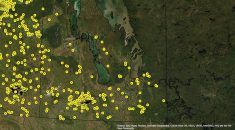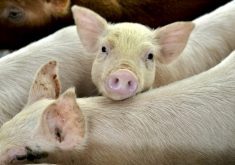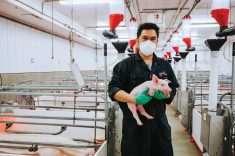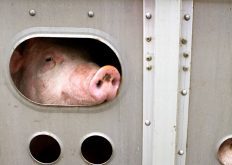The Manitoba Pork Council (MPC) has a new road map for the next five years.
The producers’ group has unveiled its 2022-27 strategic plan, presented during a series of producer meetings in late October.
Why it matters: The strategy document highlights key areas of effort for the coming years.
“I would call it an evolution,” general manager Cam Dahl said of the new plan.
MPC says the document came after extensive consultation between the staff, directors and advisers of MPC and national industry groups, but also external groups such as the province’s Office of the Chief Veterinarian, Agriculture in the Classroom, Great Tastes of Manitoba and groups they hoped would weigh in on public trust, like Ducks Unlimited.
Read Also

VIDEO: Manitoba’s Past Lane – Jan. 31
Manitoba, 1946 — Post-war rations for both people and cows: The latest look back at over a century of the Manitoba Co-operator
Public trust
That public trust element forms one of the major pillars of the new plan.
Dahl acknowledged that the topic, at this point, has been a longtime conversation for pork. It is not so long ago, for example, that the sector was locked into regulations that ground new barn construction to a standstill, regulations rooted in questions around environmental impact of hog barns.
“We’ve seen a growing focus on those questions of public trust and so there’s going to be additional focus in that area,” Dahl said.
Much like many other ag groups honing in on public trust, the council’s strategic plan includes efforts for public outreach and education, along with ongoing research into public perception of the industry. Research into improved production practices also features.
“That also includes helping producers have the tools to tell their own stories,” Dahl said.
The council has, however, decided to pivot some of its messaging. Product marketing, such as promoting pork itself to grocery shoppers, is different to public trust marketing that sells to the wider industry, MPC said. The council has identified a need to focus “more on marketing to Manitobans as citizens and voters rather than as consumers,” producers were told during the October meetings.
Growth
That focus on public trust will be joined by pillars on industry growth and productivity, producer engagement and government engagement.
Access to capital is a major issue in the industry right now, MPC said.
“A new barn is probably going to be in the $7-million to $10-million range, so how do we ensure that potential investors have access to finance?” Dahl said.
Likewise, the adoption of new technologies and facility designs will be important in growing the sector, while disease threat can never be far from the sector’s mind.
Manitoba is, for example, once again in a porcine epidemic diarrhea outbreak, thanks to a rash of cases in late October and early November. Earlier this year, MPC also joined every other pork group in North America lamenting the appearance of African swine fever in the Dominican Republic, the first time in four decades the deadly disease has made its way into the Western Hemisphere.
Animal health and welfare are among the areas of growing interest that the council considered within the plan, Dahl noted.
In short, MPC has said, strategy for the next five years will focus heavily on collaboration and communication.
Among other demographics (including women, youth and Indigenous communities), MPC has singled out engagement with small-scale pork producers. Those producers currently exist partway out of the wider system, MPC has said, something it worries leaves gaps on disease risk and animal care.
Government outreach is another major area of focus, Dahl said, noting that line item applies to all levels of government, not forgetting the local councils that issue conditional use permits for barns.
Also new will be a greater focus on data management, something that Dahl says will play into both the efficiency and profitability of the sector, but also public trust and research. The sector already has a wealth of data that could be leveraged for insights and areas of improvement, he said, while other work will identify and hopefully help fill gaps where data is still needed.
In general, the council will once again be devoting significant resources to research, according to the strategic plan. Among the research priorities, MPC has earmarked work on production practices, improved facilities, data, disease and better animal care.
















